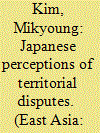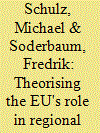| Srl | Item |
| 1 |
ID:
145142


|
|
|
|
|
| Summary/Abstract |
This article examines the causal associations between domestic Japan’s socio-psychological indices and people’s perceptions toward territorial disputes with China and South Korea. The triangulation analyses do not support most of the hypotheses except the explanatory variables of age, level of educational attainment, and Japan’s future projection: The higher the age group, the stronger the territorial sovereignty conviction; the higher the level of education, the weaker the support for the Japanese government’s hawkish policy; and the more pessimistic the future confidence of Japan, the bigger the threat perception of China. The causality could be established only when the probability level was relaxed from 0.05 to 0.10. This research finds a weak overall causal association between domestic state of affairs and territorial perceptions. The public opinion on territorial claims remains more or less the same largely independent of domestic socio-economic conditions. This observation leads to a call to revise the conventional conflict cycle theory (i.e., status quo > provocation > rise of tension > conflict relaxation) in order to reflect more of simultaneous and interactive nature of inter-state conflict (i.e., action [tension/status quo/reconciliation] > reaction [tension/status quo/reconciliation]). The intra-state affairs have become more vulnerable to unexpected and hard-to-control contingencies which defy the procedural progression of conflict management. This implies that the elites can no longer monopolize the decision on foreign affairs.
|
|
|
|
|
|
|
|
|
|
|
|
|
|
|
|
| 2 |
ID:
101006


|
|
|
|
|
| Publication |
2010.
|
| Summary/Abstract |
This article seeks to contribute to the underdeveloped discussion about the way we theorise and conceptualise externally induced peace and security operations in regional conflict, with a particular focus on the EU's role. The framework draws on three theoretical components emphasised in this special issue: the construction of conflict, security governance and the impact of EU security practices. The EU's construction of the conflict is tightly linked to decisions about the mode of security governance and here we need to pay more attention to the often-neglected relationship between the external intervening party and the parties in conflict that are subject to the intervention. Furthermore, the impact of peace operations are usually analysed in terms of implementation and coordination failures, and in our view it is necessary to step back and address the construction of the criteria by which interventions are assessed - in particular, the way intervening actors construct and define 'success and failure'.
|
|
|
|
|
|
|
|
|
|
|
|
|
|
|
|